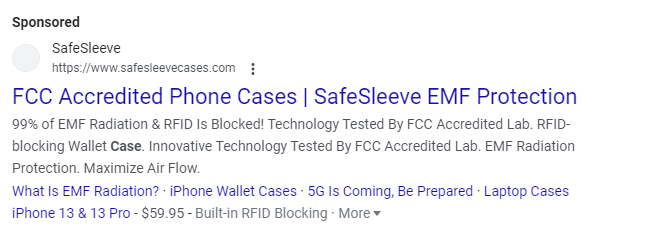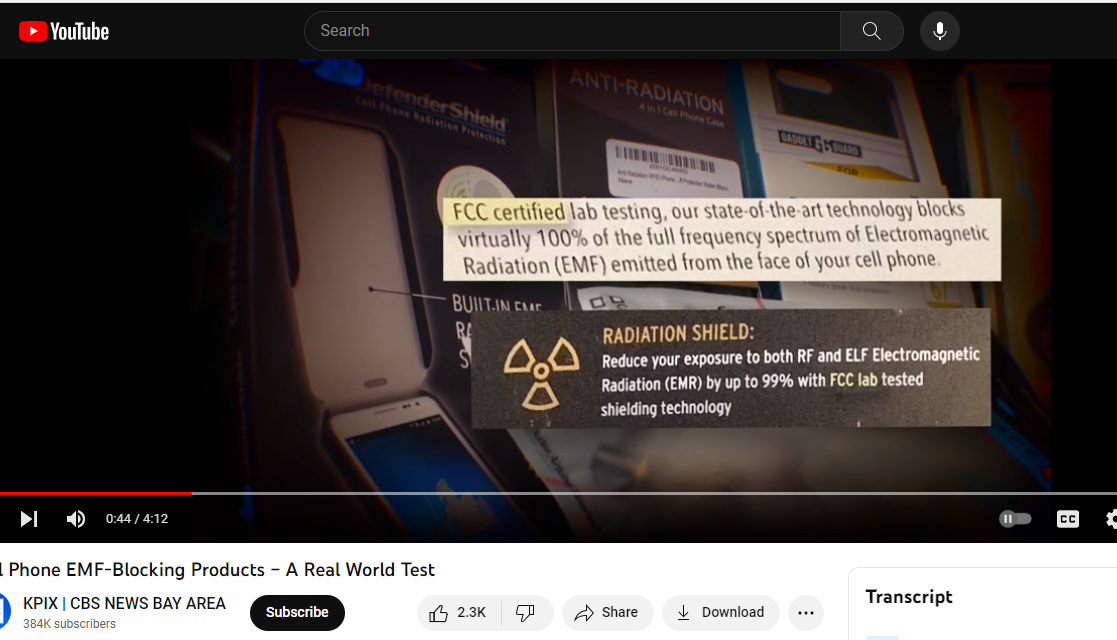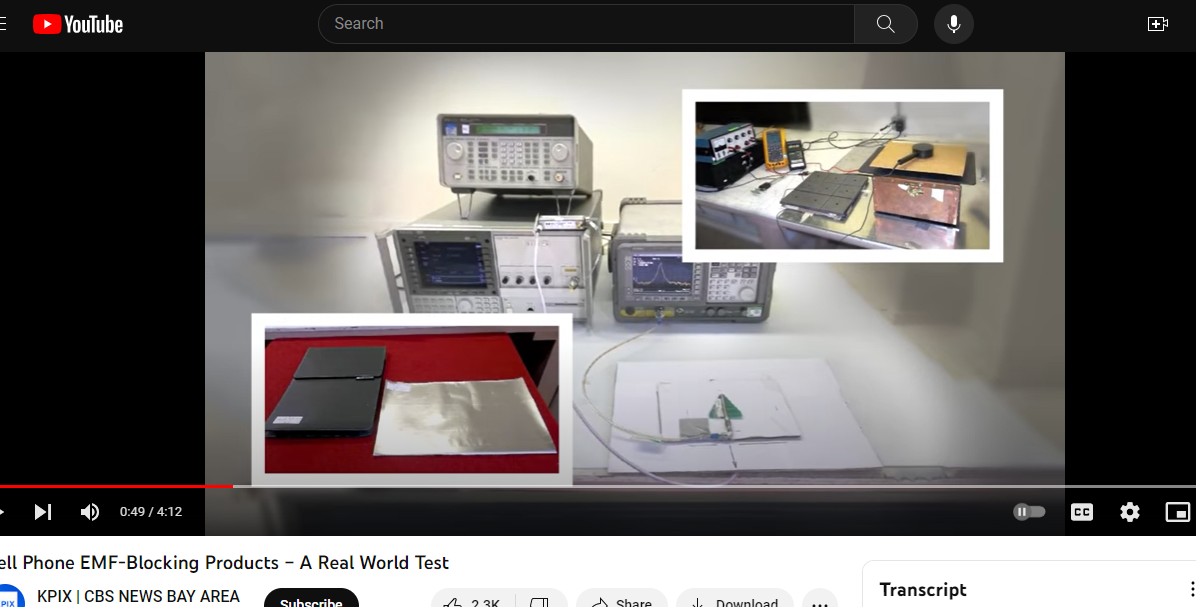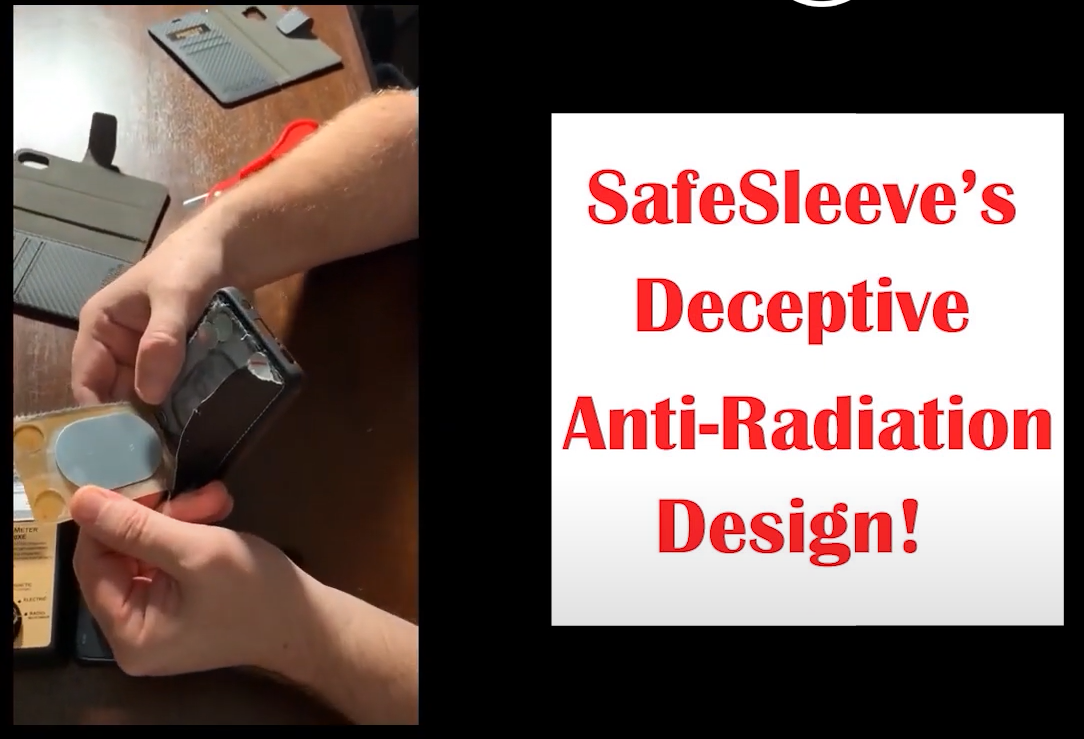Let’s set the record straight: No phone case on the market is “FCC Accredited.” This term is misleading and false. The FCC does not provide accreditation to products like phone cases. When you submit complaints to the FTC and FCC, you help correct these falsehoods. By taking action with the FTC, you’re pushing back against false advertising claims that can mislead consumers about the benefits of a product. By reporting to the FCC, you’re ensuring that companies cannot illegitimately use the FCC’s name to give unwarranted credibility to their products. Your contributions are critical to maintaining honest advertising and preserving the integrity of regulatory standards.
Two Offical Complaints About Safesleeve Advertising
The following SafeSleeve sponsored ad was served on Google on 11/30/2023 that grossly misleads the public!

Complaint #1 Misleading Advertising by SafeSleeve for EMF Protection Phone Cases
============
From: Your Full Name, Your Address,City, State,Zip Code,Email Address,Phone Number,Today’s Date
To: Federal Trade Commission. Consumer Response Center. 600 Pennsylvania Avenue, NW Washington, DC 20580
Subject: Complaint Regarding Misleading Advertising by SafeSleeve for EMF Protection Phone Cases
To Whom It May Concern,
I am writing to file a formal complaint against SafeSleeve for what I believe to be misleading advertising practices concerning their EMF protection phone cases, which are promoted as “FCC Accredited.” Based on my understanding of the Federal Trade Commission Act, specifically sections 5(a) and 12, which pertain to deceptive acts and practices and false advertisements for food, drugs, devices, services, or cosmetics respectively, I assert that the advertising language used by SafeSleeve violates these provisions.
As reported by KPIX 5 ConsumerWatch on November 14, 2017, in a piece by Julie Watts, SafeSleeve may be misleading consumers by suggesting that their products have been tested and accredited by the FCC itself, when in fact, only the shielding technology has been tested by an FCC accredited lab, not the actual product in its final form. The report states:
“Take a closer look at the product claims. Safesleeve refers to their ‘shielding technology’ and not the product itself. In many cases, the ‘FCC Certified’ labs they cite are actually testing how much RF the raw shielding material can block. They’re testing the materials used in the products. They’re not testing how much RF the actual products block while on a real-world phone.”

Watch the video starting at 43 seconds here
This use of language in their advertising and promotional materials could easily lead consumers to believe that the phone cases themselves are accredited by the FCC, which is not the case, as the FCC does not accredit individual products. The advertisement creates an impression of a level of safety and endorsement that is not accurate. This discrepancy between the marketing claims and the reality of the product’s testing and certification poses potential harm to consumers who are seeking to reduce their exposure to EMF radiation for health reasons.
I am concerned that this advertising may not only be a violation of the FTC Act but could also potentially harm consumers who rely on these misleading claims to make informed decisions about their health and safety.
Safesleeve also markets a detachable phone case as anti-radiation in design while embedding a large plate of metal over the back of the phone that disrupts the phone’s antenna, which can increase the phone’s output power due to a lowered signal condition. Therefore, I urge the FTC to investigate this matter promptly and take appropriate action to ensure that SafeSleeve’s advertising accurately reflects the extent and scope of testing and certification of their products.
Enclosed are copies of the advertisement in question and the transcript of the KPIX 5 ConsumerWatch report for your reference.
Thank you for your attention to this matter.
Sincerely,
[Your Signature (if sending a hard copy)] [Your Printed Name]
=================
Please act now to defend consumer rights and public health! Misleading advertising is not just a minor annoyance; it’s a serious issue that can affect health and safety. Your complaint to the FTC and FCC can trigger investigations, compel transparency, and enforce accuracy in product claims. Each submission is vital, as it adds to the collective call for action, urging these agencies to ensure that companies market their products honestly. Stand up against deceptive practices—your voice is crucial in maintaining a fair marketplace where truth in advertising is not just expected, but demanded.
Complaint #2 Misuse of FCC Name for Product Endorsement
========
Your Full Name, Your Address,City, State,Zip Code,Email Address,Phone Number,Today’s Date
Federal Communications Commission Consumer and Governmental Affairs Bureau Consumer Inquiries and Complaints Division 45 L Street NE Washington, DC 20554
Subject: Complaint Regarding Misuse of FCC Name for Product Endorsement
To Whom It May Concern,
I am writing to file a formal complaint against SafeSleeve for the potentially unlawful use of the Federal Communications Commission (FCC) name in their product advertising, which may falsely imply FCC endorsement or accreditation.
In their promotions, SafeSleeve claims their phone cases are “FCC Accredited.” This term misleads consumers to believe that the FCC has endorsed these products, which is not accurate. The FCC does not provide accreditation to products, only to laboratories for testing compliance with FCC standards. I believe this usage contravenes 18 U.S.C. § 709, which prohibits falsely conveying in an advertisement that a business is affiliated with or endorsed by a federal agency.
This misleading use of the FCC’s name could potentially lead consumers to place undue trust in the product’s claimed capabilities. As such, I request that the FCC investigate this matter to determine the appropriateness of SafeSleeve’s advertising practices and take necessary actions to prevent potential deception of consumers.
Enclosed are copies of the advertisements in question for your review.
Thank you for your attention to this important consumer matter.
Sincerely,
[Your Signature (if sending a hard copy)] [Your Printed Name]
==============
Only shielding is tested in an FCC lab, not the actual phone case. Besides the FCC does not do any kind of accreditation on phone cases!

Warning “Antenna Blocking” Metal plate found inside back of Safesleeve detachable anti-radiation case
We are raising the alarm and urgently call for your support! By filing a complaint with the FTC, you help combat deceptive advertising that can mislead consumers about product safety and efficacy. Each report prompts scrutiny and can enforce truthfulness in marketing, safeguarding consumer interests. Simultaneously, alerting the FCC about the misuse of their name in product endorsements is crucial. It prevents the erosion of trust in the FCC’s authority and ensures that companies cannot falsely claim federal endorsement, maintaining the credibility of communication regulations. Your proactive engagement is essential in upholding the integrity of both consumer protection and federal oversight.